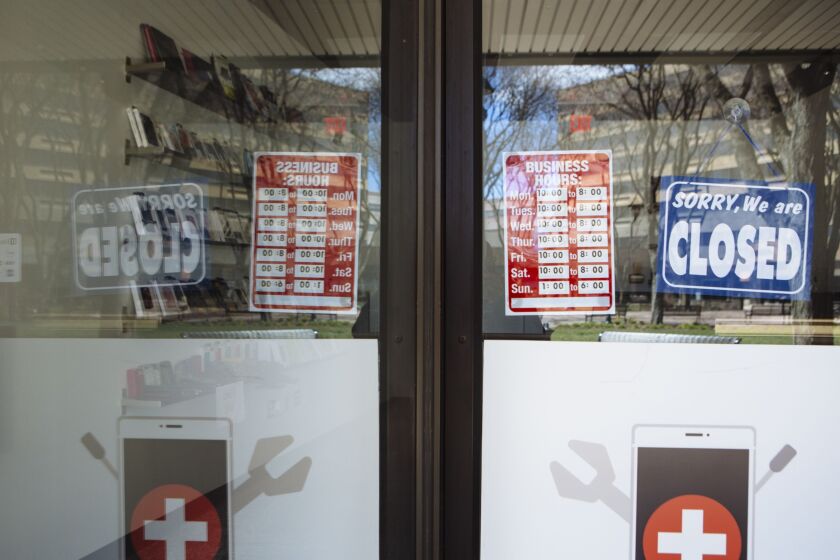The Small Business Administration and the Treasury Department unveiled a simpler loan forgiveness application for the Paycheck Protection Program to reflect changes in the PPP Forgiveness Act, which was signed into law this month and provides more flexibility to small businesses to receive forgiveness on their SBA-backed loans.
The PPP was included as part of the CARES Act, the $2.2 trillion program that included economic impact payments to individuals and aid to businesses in response to the novel coronavirus pandemic. The program initially launched on April 3 with $349 billion in funding to help small businesses keep their doors open and retain their employees. The loans would be forgiven as long as businesses retained their employees for up to eight weeks.
Rathi Murthy is the Chief Technology Officer at Varo Bank, the first nationally chartered all-digital consumer bank in the United States. In this role, she leads the company's end-to-end technology strategy, overseeing the design and development of secure, scalable, and AI-powered digital banking platforms. Her leadership is instrumental in advancing Varo's mission to build inclusive, accessible, and real-time financial solutions for millions of consumers.
A seasoned technology executive, Rathi brings over 25 years of experience leading innovation and digital transformation at some of the world's most recognized technology and financial services companies. Prior to joining Varo, she served as Chief Technology Officer and President of Expedia Product & Technology at Expedia Group, where she modernized the company's global travel infrastructure, integrating AI-driven personalization, modular architecture, and advanced cloud capabilities across its family of brands.
Earlier, she held executive leadership roles at Verizon Media and Gap Inc., where she led enterprise cloud migrations, e-commerce platform evolution, and large-scale product delivery initiatives across global markets.
Rathi also served as Senior Vice President and Chief Information Officer of Enterprise Growth at American Express, where she was responsible for the technology strategy and operations of the Serve platform and a suite of prepaid products including Bluebird.
Rathi's early career includes engineering leadership roles at eBay, Yahoo!, Sun Microsystems, and WebMD, where she consistently delivered improvements in platform stability, operational agility, and customer experience.
In addition to her executive work, Murthy is a board member at PagerDuty, Inc., a leader in digital operations management, and serves as an External Expert Advisor to the University of San Francisco's Board of Trustees Committee on Information Technology Strategy. She is also a regular speaker at industry events and leadership forums, offering thought leadership on topics such as fintech innovation, integrating AI, platform transformation, and executive technology leadership.
Guy Baker, CFP, Ph.D., is the founder of Wealth Teams Alliance in Irvine, California.
He is a member of the Forbes 250 Top Financial Security Professionals list and is author of "Maximize the RedZone," a guide for business owners, as well as "The Great Wealth Erosion," "Manage Markets, Not Stocks" and "Investment Alchemy." He received the 2019 John Newton Russell Memorial Award for lifetime achievement in insurance.
However, many small businesses had trouble accessing the loans or applying for them, and the funding quickly ran out as larger companies managed to get the loans with the help of their banks. Congress provided another $320 billion and the program resumed on April 27. But the rules and eligibility and forgiveness criteria have been changing constantly, prompting many businesses to take a wait-and-see attitude. Around $120 billion to $130 billion is still left in the program, and it doesn’t run out until June 30. Lawmakers have expressed frustration that the Treasury and the SBA are not providing more transparency about which businesses have gotten the loans and for how much.

In an effort to encourage more businesses to sign up and to alleviate concerns about being able to get the loans forgiven for businesses like restaurants that haven’t been able to open to customers, Congress provided more flexibility by passing the Paycheck Protection Program Forgiveness Act earlier this month. It extends the covered period from eight weeks to 24 weeks. It also amends the requirement that no more than 25% of the loan forgiveness amount be attributed to non-payroll costs and allows up to 40% to be used for non-payroll costs. The bill also included several other changes, such as extending the deferral of payments of loan principal, interest and fees, from the current six months, until the date when the SBA pays the forgiveness amount to the lender.
The new loan forgiveness application from the SBA reflects these changes. Along with revising the full forgiveness application, the SBA is also introducing a new EZ version of the forgiveness application that applies to borrowers who:
- Are self-employed and have no employees; or
- Did not reduce the salaries or wages of their employees by more than 25%, and didn't reduce the number or hours of their employees; or
- Experienced reductions in business activity as a result of health directives related to COVID-19, and did not reduce the salaries or wages of their employees by more than 25%.
The EZ application requires fewer calculations to be done and less documentation is needed for eligible borrowers. Details about the applicability of the various provisions are available in the instructions accompanying the new EZ application form.
Both applications give borrowers the option of using the original eight-week covered period (if their loan was made before June 5, 2020) or the extended 24-week covered period provided under the new law. The SBA and Treasury said the changes would result in a more efficient process and make it easier for businesses to realize full forgiveness of their PPP loan.
Click here to view the EZ Forgiveness Application.
Click here to view the Full Forgiveness Application.
Separately, the payroll company Paychex released the PPP Loan Forgiveness Estimator and Forgiveness Report as part of its Paychex Flex set of cloud-based HR software to help small businesses keep track of their PPP loans and loan forgiveness requirements last week. It includes changes from the PPP Forgiveness Act. Accountants can access the Forgiveness Estimator for each of their clients through the Paychex AccountantHQ dashboard to provide more strategic consultation and help clients optimize PPP loan forgiveness.
Another company, Smart Communications, introduced a PPP Loan Forgiveness Application Solution on Wednesday to simplify applications and speed processing for banks and other lenders.


